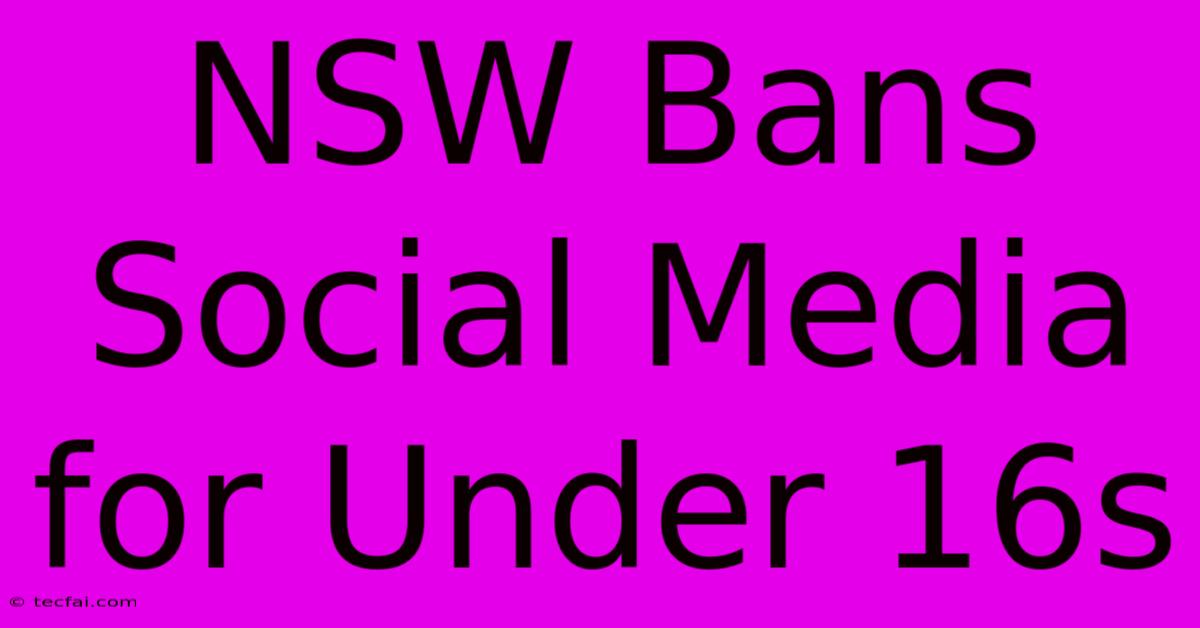NSW Bans Social Media For Under 16s

Discover more detailed and exciting information on our website. Click the link below to start your adventure: Visit Best Website tecfai.com. Don't miss out!
Table of Contents
NSW Bans Social Media for Under 16s: A Bold Move or an Impossible Task?
New South Wales (NSW) is considering a groundbreaking move: a complete ban on social media platforms for children under the age of 16. This proposal has ignited a fierce debate, pitting parental rights against children's online freedoms. While the intention – to protect young people from the harms of online environments – is laudable, the practicalities and potential consequences raise serious questions. This article will delve into the arguments for and against the ban, exploring the complexities of regulating children's online lives in the digital age.
The Rationale Behind the Ban: Protecting Vulnerable Minds
Proponents of the ban argue that children under 16 are particularly vulnerable to the negative impacts of social media. These include:
- Cyberbullying: The anonymity and reach of online platforms make cyberbullying a significant threat, potentially leading to severe mental health issues.
- Body Image Issues: Constant exposure to curated and often unrealistic portrayals of beauty on social media can contribute to low self-esteem and eating disorders.
- Addiction and Mental Health: The addictive nature of social media platforms can negatively impact sleep, academic performance, and overall mental wellbeing.
- Privacy Concerns: Children may unknowingly share personal information, exposing themselves to risks of online predators and identity theft.
- Exposure to Inappropriate Content: Despite age restrictions, children can easily access harmful or inappropriate content, including violence, hate speech, and sexually explicit material.
These concerns are not unfounded. Numerous studies have linked increased social media usage among adolescents to mental health problems, including anxiety and depression. The NSW government's proposed ban aims to proactively address these issues by limiting children's exposure to the potential harms of these platforms.
The Challenges and Criticisms: Enforceability and Freedom
However, the proposed ban faces significant challenges:
- Enforceability: How can a ban be effectively enforced? Monitoring every child's online activity is practically impossible. Furthermore, children could easily circumvent restrictions using alternative methods or parental devices.
- Freedom of Expression: Critics argue that a ban infringes on children's rights to freedom of expression and access to information. Social media can be a valuable tool for connecting with friends, family, and communities.
- Digital Divide: A ban could exacerbate the existing digital divide, disproportionately affecting children from disadvantaged backgrounds who may rely on social media for education and access to resources.
- Lack of Education: Rather than a ban, many argue that a focus on digital literacy education and parental guidance is a more effective approach. Teaching children responsible online behavior is crucial.
The effectiveness of a blanket ban is debatable. While the intention is to protect children, the practical implications and potential unintended consequences require careful consideration. A more nuanced approach might prove more fruitful.
Alternative Solutions: Education and Parental Control
Instead of a complete ban, a more comprehensive strategy could involve:
- Strengthening parental controls: Empowering parents with tools and resources to manage their children's online activity.
- Improving social media platform accountability: Holding social media companies responsible for protecting children's safety and wellbeing.
- Comprehensive digital literacy programs: Equipping children with the knowledge and skills to navigate the online world safely and responsibly.
- Collaborating with schools and community organizations: Creating a collaborative effort to educate children, parents, and educators on the risks and benefits of social media.
Ultimately, protecting children in the digital age requires a multi-pronged approach that combines education, parental involvement, platform accountability, and thoughtful policy-making. A simple ban, while seemingly straightforward, may not be the most effective or equitable solution. The NSW government needs to carefully consider the potential unintended consequences before implementing such a drastic measure. The debate surrounding this proposal is likely to continue, highlighting the complexities of balancing online safety with children's rights and freedoms in the 21st century.

Thank you for visiting our website wich cover about NSW Bans Social Media For Under 16s. We hope the information provided has been useful to you. Feel free to contact us if you have any questions or need further assistance. See you next time and dont miss to bookmark.
Featured Posts
-
Live Blog Heidenheim Vs Chelsea Ucl
Nov 29, 2024
-
Where To Stream Lions Bears Game
Nov 29, 2024
-
Will Drew Lock Start Week 13 Giants
Nov 29, 2024
-
Tmj Headache Pain Zoe Balls Case Explained
Nov 29, 2024
-
Serious Crash Near Gin Gin
Nov 29, 2024
